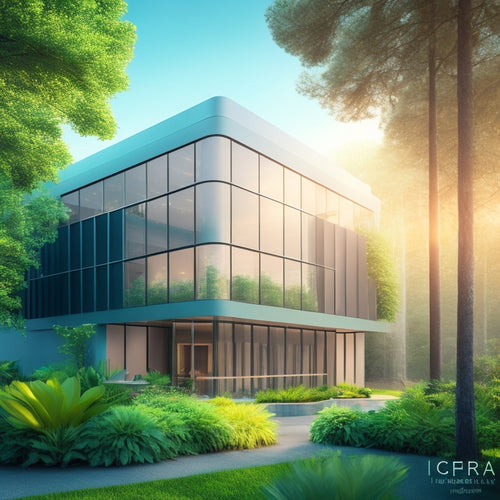
3 HVAC Innovations for Net-Zero Home Efficiency
Share
You're on a mission to achieve net-zero home efficiency, and innovative HVAC solutions hold the key to accessing significant energy savings and a reduced carbon footprint. Advanced compressor designs, novel refrigerant blends, and the integration of renewable energy sources are three HVAC innovations that can get you closer to your goal. These state-of-the-art technologies not only minimize carbon footprint but also optimize energy consumption, enabling you to create a sustainable and eco-friendly living space. As you investigate these innovations further, you'll uncover even more opportunities to fine-tune your HVAC system for maximum efficiency and minimal environmental impact.
Key Takeaways
- Advanced compressor designs and novel refrigerant blends in HVAC systems reduce energy consumption and environmental impact for net-zero home efficiency.
- Smart sensing technologies and real-time data analytics enable optimized energy usage and consumption decisions, leading to reduced energy costs.
- Integration of renewable energy sources, such as solar power, minimizes carbon footprint and reliance on traditional power sources for HVAC systems.
- Energy recovery technologies, like heat exchangers, can cut energy consumption by up to 50%, contributing to net-zero home efficiency.
- Smart thermostats with advanced sensors and machine learning capabilities optimize energy optimization and create a seamless energy management system for homes.
Emerging Technologies for HVAC
Three key areas of innovation are revolutionizing the HVAC industry: advanced compressor designs, novel refrigerant blends, and smart sensing technologies.
You're likely to benefit from these emerging technologies as they improve the efficiency and sustainability of your home's heating, ventilation, and air conditioning systems. For instance, advanced compressors can enhance energy consumption, while novel refrigerant blends reduce environmental impact.
The integration of renewable energy sources in HVAC systems can further minimize carbon footprint.
Smart sensing technologies, on the other hand, enable real-time monitoring and control of your HVAC systems, ensuring peak performance.
Additionally, you may consider exploring geothermal systems, which utilize the earth's natural temperature to provide heating and cooling.
Variable refrigerant flow systems are another option, allowing you to customize your HVAC setup to suit your specific needs.
Optimizing Heating and Cooling Systems
With a focus on optimizing heating and cooling systems, you can release significant energy savings and move closer to achieving net-zero home efficiency.
By implementing zoned heating, you can direct heat only to occupied areas, reducing energy waste and increasing comfort. This approach can lead to energy savings of up to 30%.
In addition, incorporating energy recovery technologies, such as heat exchangers, can further reduce energy consumption by up to 50%.
Moreover, integrating energy storage solutions can enhance overall energy efficiency and reduce peak demand charges.
By leveraging smart grid and energy management systems, you can optimize your energy distribution and consumption.
These strategies not only reduce your carbon footprint but also provide a sense of freedom from high energy bills.
Smart HVAC Solutions for Tomorrow
Your HVAC system is on the cusp of a revolution, thanks to innovative smart technologies that promise to change the way you heat and cool your home.
Smart thermostats, equipped with advanced sensors and machine learning algorithms, can optimize your energy consumption by learning your schedule and preferences. They can also integrate with other smart devices to create a seamless energy management system.
By leveraging solar-powered solutions, homeowners can reduce their reliance on traditional power sources and lower their carbon emissions.
With real-time data analytics, you'll have complete control over your energy usage, allowing you to make informed decisions about your energy consumption.
This means you'll be able to reduce your carbon footprint, save money on your energy bills, and enjoy a more comfortable living space – all while achieving net-zero home efficiency.
Frequently Asked Questions
Can I Retrofit My Existing Home With Net-Zero HVAC Solutions?
You can retrofit your existing home with net-zero HVAC solutions, exploring options like heat pump systems, radiant floor heating, and solar-powered ventilation. Weigh cost considerations, such as upfront investment and long-term energy savings, to prioritize the most efficient and cost-effective approach.
How Do I Balance Energy Efficiency With Indoor Air Quality Concerns?
As you steer through the delicate dance between energy efficiency and indoor air quality, consider the harmony of a musical ensemble, where each instrument plays its part - you'll find balance by incorporating energy recovery and advanced ventilation systems that work in tandem to create a healthy, efficient haven.
Are There Incentives for Homeowners to Adopt Net-Zero HVAC Systems?
You'll find that adopting net-zero HVAC systems can pay off, literally! You're eligible for federal incentives, local rebates, and tax credits, which can offset system costs, making energy-efficient upgrades more affordable with attractive financing options.
Can I Use Renewable Energy Sources to Power My HVAC System?
Unleash the power of freedom from fossil fuels! You can utilize solar power or geothermal energy to fuel your HVAC system, reducing carbon emissions and reliance on the grid, and embracing a cleaner, more independent lifestyle.
Do Net-Zero HVAC Systems Require More Maintenance Than Traditional Systems?
You'll find that net-zero HVAC systems typically require more frequent maintenance to guarantee peak performance, but this increased frequency can lead to longer system longevity, ultimately giving you more freedom from costly repairs and replacements.
Related Posts
-

How to Upgrade Your Home With Geothermal Innovations
You're now on the cusp of utilizing the Earth's natural thermal energy to revolutionize your home's heating and cooli...
-

7 Best Home Hydrogen Fuel Cells for Clean Power
You're considering adopting hydrogen fuel cells for clean power at home, but you want to know the best options. Reput...
-

7 Top HEPA Filters for Green Building Projects
You need a reliable HEPA filter for your green building project that aligns with your sustainable goals and guarantee...


